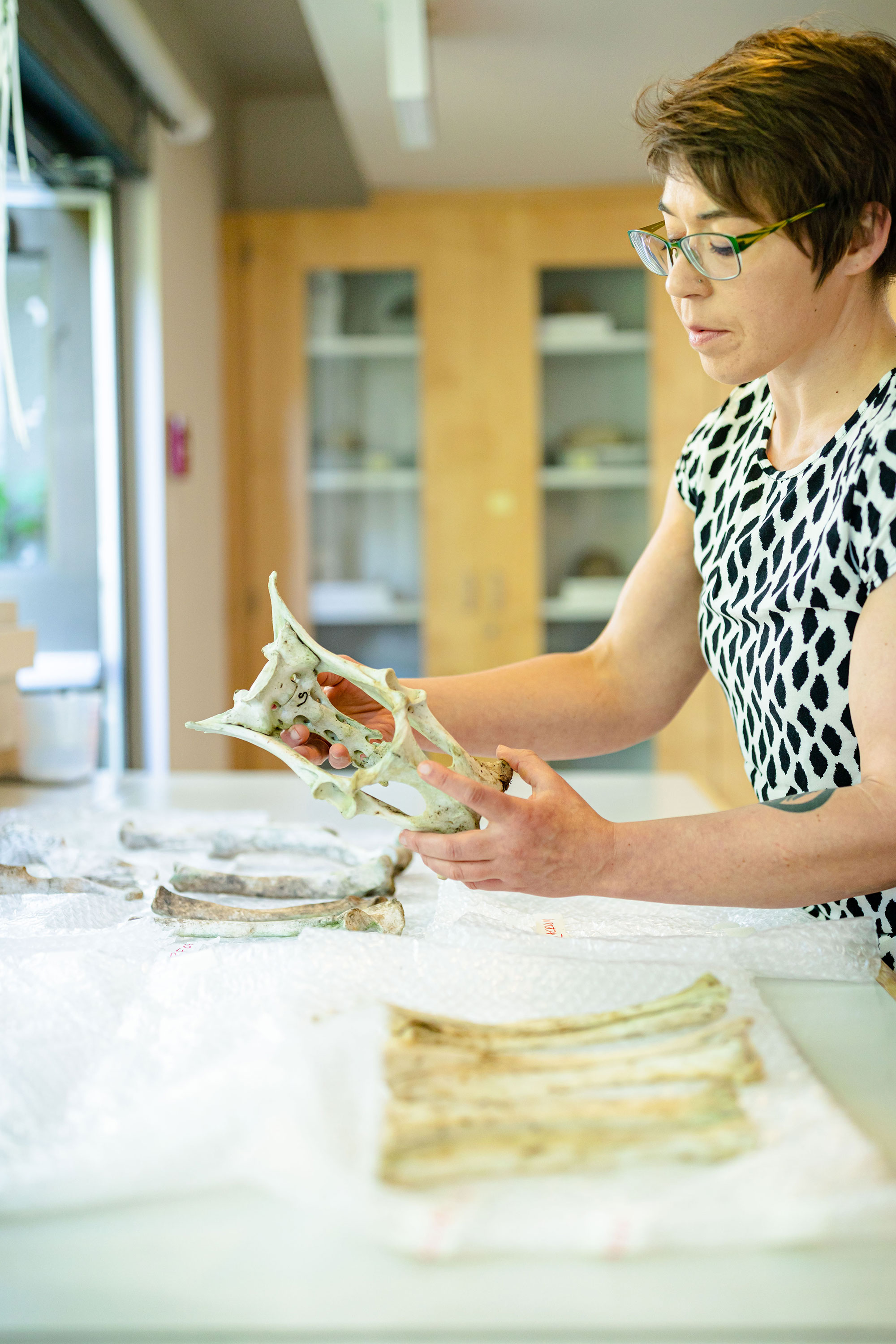My university journey began in the summer before my first year, when, on a bright day in July, I stepped for the first time into Dr. Elizabeth Doyle’s Forensic Anthropology class.
As one who feasts on crime novels and draws on Tarot cards as inspiration for writing Gothic sonnets, I was initially captivated by the riveting blurb on the Course Schedule page. Some excerpted phrases: “skeletal remains,” “crime scenes,” and “unexplained deaths.”
For many reasons, this class has earned a special place in my heart. It was my first UBC lecture, my first Arts elective—and the first course I took that inspired me to pick what’s now my specialization: Biochemistry and Forensic Science (Combined Honours).
The top reason—Dr. Doyle, the charismatic and articulate individual who taught it. Without her, I’d never have pursued forensics with the fervour she instilled in me through her well-curated lectures and lab sessions. She has also shown immense kindness: one morning before class, when she saw me struggling to operate a broken water fountain, she offered to use her key as a makeshift handle—and it worked.
So, I decided to reach out to Dr. Doyle to be part of this series. We met in the lab in the Anthropology and Sociology Building, and we sat down near a cabinet of skeletal specimens, which—like Yorick’s skull—really set the ambience for a session of peering into the past.
A travel back in time
Dr. Doyle started in Anthropology at Camosun College, and transferred to SFU, where she received her B.A. in Archaeology. She then completed her M.A. and her Ph.D. (both in Biological Anthropology) at the University of Toronto. “It really was just a step-by-step process of following my interests and my capacities,” she says.
I was curious about how she fostered her interests in the first place. To that, she recounts, “I was one of those little kids who was always digging in the dirt, was really interested in dinosaurs, and went on and became an archaeologist or, more broadly, an anthropologist.”
For Dr. Doyle, this wider field of anthropology is rewarding because of its applicability. “It informs my perspective on the wider world as it is, as well as the wider world going back in time.”
That sentiment gave me a sudden revelation: looking down (through archaeology) can lead to the same phenomenon as looking up (through astronomy).
Looking at bones is like looking at faraway stars—what we’re seeing now is what remains from the past.

A unique and unconventional route
Dr. Doyle has always been about following her interests first, and then “figuring out ways to make them fit a career path.” With a focus on the fields of anthropology and archaeology, she is a contract faculty member at UBC and also teaches at SFU.
Personally, I feel that Dr. Doyle has a gift for engaging students. I vividly remember how her class slides contained Sherlock references, quotes from detective fiction, and puns (e.g. “I found this humerus”), and how she held a Jeopardy! game as a review activity for our final.
Beyond teaching, she practices as a coroner with BC Coroners Service, which investigates all sudden, unexpected, or unexplained deaths in the province. Highly interested in applying her knowledge in the field, Dr. Doyle is involved in collaborating with police and other stakeholder agencies to investigate deaths in the field, and doing follow-up work, such as writing reports and liaising with families of the deceased.
“On the side, sometimes very much on the side,” Dr. Doyle explains, “I am developing a small research consultancy.” In it, she provides info and evidence for policy-makers and advocates alike. Her primary objective, I learned, is “to use anthropological tools, quantitative and qualitative research methods, for good in the world.”
A robust balance
Because of the heavy nature of her work and her many responsibilities, Dr. Doyle admits that she is an introvert and favours taking “quiet time” for herself to stay balanced, or, as she jokes, “externally balanced.” But how does she usually overcome challenges at work?
“I’ve honestly dealt with them by being extremely stubborn, and being willing to tackle them, which can be scary and bad for the ego.” (I nod fervently.) “Arguably, this applies in the academic space as well. After the appropriate amount of agonizing, I’ve always made my way out of them by, sooner or later, asking for help.”
Taking on an anthropological standpoint, Dr. Doyle says, “We tend to frame our lives as being independent [...] and everybody’s conceived of as being responsible for everything to do with themselves. But we’re ultimately social creatures, and we thrive when we can count on support from others, and reciprocate in terms of those supports.”
3 pieces of advice Dr. Doyle wants you to know
Here are some insights from the anthropological lens that Dr. Doyle thinks “can help students navigate not only their lives as students but also the greater world beyond”:
1. “Being willing to reach out and ask for help is a difficult but essential skill.”
2. “Recognize that you belong here. Even if it feels really tough and alienating at times, you can make space for yourself here.”
3. “Recognize how diverse we are as a species. Everybody else is as human as you are. We all have a lot of shared concerns but very diverse ways of thinking about and approaching the world. We can, given the opportunity and sufficient guidance, figure out how to work together.”
Take the time to get to know your profs and what they do beyond teaching—maybe you’ll be inspired to choose a similar path!
For the remainder of our conversation, Dr. Doyle and I discuss my specialization, and, near the end, she gives a final tip, which I immediately took a fancy to: “Just be okay with being weird.”



